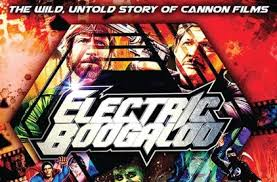By Mark Saldana
Rating: 3.5 (Out of 4 Stars)
Director Mark Hartley (Not Quite Hollywood, Machete Maidens Unleashed) continues his series of documentaries on cinema history with another brash and entertaining film about a couple of infamous Israeli producers who took the film world by storm. Starting in the late 1970s and continuing through the 1980s and early 90s. Menahem Golan and Yoram Globus dominated cinema with the Cannon label, producing an astounding number of titles in a variety of genres. The zealous pursuit of their dreams and ambitions did come with consequences, though, as Cannon would eventually hemorrhage money and would have to shut down.
Hartley has created yet another delightful and entertaining documentary which serves as a nostalgic piece for those familiar with Cannon’s history and filmography ,and as an educational journey for those unfamiliar. He has once again assembled an assortment of actors and filmmakers who lived and worked during Cannon’s reign, and everyone offers some awesomely amusing and/or fascinatingly insightful accounts and impressions of their experiences with Cannon. I had the pleasure of speaking with director Mark Hartley during the festival. Hartley, who obviously has a love for cinema history, also expressed much love for Cannon and lots of respect for the accomplishments of Menahem Golan and Yoram Globus.
Mark Saldana: What inspired you to make this documentary?
Mark Hartley: I had made two other documentaries (Not Quite Hollywood, Machete Maidens) and they were accidents because I always wanted to make narrative features. We finally almost did a narrative film, but there was an eight month window between going into production, getting cast, and getting financed. People kept going on, asking, “Please make another documentary.” If I was going to do one more, this was the kind of opening to do it. I had just read Michael Winner’s ( a Cannon film director) biography, Winner Takes All, and he had great stories about working with Cannon. Not Quite Hollywood and Machete Maidens are very much about the 60s and 70s. I thought maybe I should tell a story that’s rooted in the 80s and that Cannon logo was pretty iconic during the 80s.
M.S.: As mentioned in the film, there is another documentary about Golan, Globus, & Cannon. What are your thoughts on this documentary? Do you feel that it is more biased than yours, considering that it had more support from Golan and Globus?
M.H.: At first I thought it would be a puff piece, but it certainly isn’t anywhere near as much as I thought it would be. It’s a pretty good companion piece to our film because our film does chart the whole history of Cannon, going into productions. Their’s mainly focuses on the relationship between Menahem and Yoram. The filmmaker asks the tough questions. Yoram is happy to answer them. Menahem is not.
M.S.: Do you have a favorite Cannon film?
M.H.: My favorite Cannon film is Lifeforce. I saw it at the right age. I must have been about sixteen or seventeen, and to this day I have never seen anything as crazy. It has everything you’d want from a film–a vampire/zombie/end-of-the-world, apocalyptic/nudie/sci fi movie. The great thing about Cannon, which doesn’t exist today in any studio or any indie studio, is the breadth of different films they were making. They were making art house films back to back with Ninja movies back to back with Charles Bronson movies back to back with teen movies back to back with any kind of film they could possibly sell. And we don’t see that anymore.
For fans of Mark Hartley’s previous documentaries, Electric Boogaloo: The Wild Untold Story of Cannon Films is a must see. It makes for a fun trip down memory lane for people who grew up watching Cannon movies during the 1980s.
